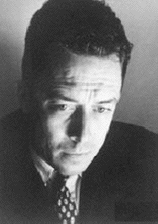November 7: Albert Camus
Albert Camus (1913)
It was on this date, November 7, 1913, that French existentialist philosopher Albert Camus was born in Mondovi, Algeria. Camus studied philosophy with the idea of teaching it, but also discovered theater and journalism, working at those endeavors full time by 1938. In World War Two (1941) he joined the French Resistance against the Nazis and edited Combat, an underground newspaper.
He established an international literary reputation with a succession of works including The Stranger (1946), The Plague (1948), The Rebel (1954) and The Myth of Sisyphus (1955). He was awarded the 1957 Nobel Prize for Literature, but said he would have voted for his friend André Malraux!
On 4 January 1960, Camus was killed in an automobile accident on a return trip to Paris, at age 46. It was Albert Camus who said, while addressing Dominican priests in 1948,
I shall not, as far as I am concerned, try to pass myself off as a Christian in your presence. I share with you the same revulsion from evil. But I do not share your hope, and I continue to struggle against this universe in which children suffer and die.*
Elsewhere, Camus said, "If Christianity is pessimistic as to man, it is optimistic as to human destiny. Well, I can say that, pessimistic as to human destiny, I am optimistic as to man." And, in his 1947 novel, The Plague, Camus wrote, "Since the order of the world is shaped by death, mightn't it be better for God if we refuse to believe in Him, and struggle with all our might against death without raising our eyes towards the heaven where He sits in silence?"
* quoted in Albert Camus, Resistance, Rebellion, and Death, 1961, essay "The Unbeliever and Christians," p. 70 (translated by Justin O'Brien).
Originally published November 2003 by Ronald Bruce Meyer.


